
The Mission – 1986
This really was a great film. Not only was the casting and the acting spot on, it had great and lofty dramatic themes, one of the most beautiful scores ever written, action, drama, great pacing, inspirational cinemastography, and wonderful directing. In 1986, it lost the Best Picture Award to Platoon. I don’t know. That was a pretty good movie, too, but I would have voted for The Mission. Robert De Niro was fantastic, as was Jeremy Irons. Add a couple of other well-known names like Aiden Quinn and Liam Neeson, and you have a wonderful film.
First of all, whenever anyone mentions this movie, the first thing that comes to my mind is the beautiful and haunting score by Ennio Morricone. To say that the music is incredible is an understatement. The film score is nothing short of transcendent. I cannot listen to it without my eyes misting over and tears threatening to roll down my cheeks. I felt that way about the music long before I ever saw the movie. It strongly conveys the dramatic themes that are the whole thrust of the movie. The lofty and ethereal theme known as Gabriel’s Oboe is absolutely gorgeous.
The film takes place in Paraguay, in 1750s South America and is about two men. One, Father Gabriel, played by Irons, is a Jesuit Priest who establishes a Mission at the top of Iguazu Falls, and helps the native Guarani tribe by protecting them from Spanish slavers. The other is Rodrigo Mendoza, a slave trader whose job it is to abduct Guarani natives and sell them into slavery. But after Rodrigo accidentally murders his own brother, played by Quinn, he is filled with such remorse that he voluntarily locks himself in a prison.
Father Gabriel visits him and convinces him to do penance and regain his life. Rodrigo travels to the Mission and helps them to build a church. He becomes a part of the Guarani tribe and decides to devote his life to God and become a Jesuit monk. The main conflict comes when Spain decides to cede the land on which the Mission, and thus the Guarani tribe, live to Portugal. The Portuguese want all the natives off their land and they send in soldiers to eliminate the native savages.
Father Gabriel and Rodrigo react to the situation in different ways. Rodrigo refuses to abandon the natives. Instead, he breaks his vows of peace and fights back to defend the Guarani people. He is joined by Father Fielding, played by Neeson. They both die in the battle. Believing that meeting violence with violence is a sin, but also not willing to abandon the Guarani people, Father Gabriel stays with the Christian converts as they allow themselves to be slaughtered.
Of course, it is much more complicated than that. The movie is heartbreaking as it explores the absolute cruelties of mankind. The heartless genocide carried out by the Portuguese soldiers, is matched only by the Spanish government and the Catholic Church who allowed them to do it. But the film was also incredibly uplifting as the characters of Father Gabriel and Rodrigo meet their fates, each in their own way, with honor and faith. There is laudable nobility in a man who is willing to fight and die for a cause he believes in. But there is also a certain kind of honor and courage in a man who is willing to lay down his life as a martyr.
Also, one of the best parts of the movie is the scenes in which Rodrigo is rising from the pits of self-inflicted despair and self-loathing to honor and redemption. It was inspiring to watch. So well-done! And again, the score perfectly reflected and enhanced the feeling of spiritual redemption and salvation. In hindsight, it made the ending so much more tragic.
The little bit of research I did said that the film was fairly accurate with only minor discrepancies. For example, the main plot was factual, though the characters of Father Gabriel and Rodrigo were fictional. And in light of that, in reality, no priests or monks fought with or were killed with any of the Guarani. They all left the Missions when ordered to do so by their superiors. The Guarani fought their own war which lasted over three years.
It was a wonderful film that was beautifully done. It was nominated for 7 Academy Awards, but I’m sorry to say, it only took home one Oscar. It was for Best Cinematography. None of the actors were nominated, and though Ennio Morricone was nominated for his phenomenal score, he did not win. Director Roland Joffe was also nominated for Best Director, though he, too, went home empty handed.
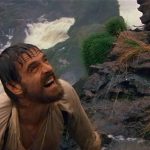

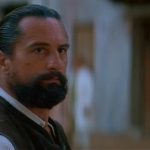
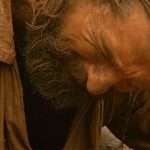
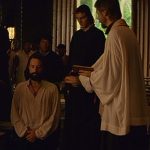

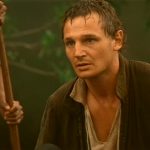
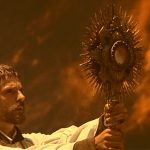
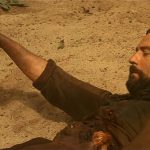
It’s a shame “The Mission” won only one Oscar. The reason we don’t know, but could it have been rivalry and jealousy?